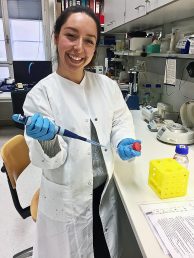Early Outreach Program gets students engaged in STEM fields
The Early Outreach Program — part of UIC’s Urban Health Program — helps develop elementary and high school students’ skills in science and research to prepare them for college and careers in health and medicine.
The program has served more than 25,000 students in the Chicago area since the 1980s. The majority of its students are from non-dominant populations that are under-represented in the health sciences fields. Approximately 67 percent are from Chicago public schools and 83 percent are black or Latino.
Students who participate in the Early Outreach Program — which includes a Saturday enrichment program that runs during the academic year and a six-week summer enrichment program — often come back year after year. The average graduate of the Early Outreach Program has been enrolled for 6.5 years, according to Joy Valentine, the program director.
“Many of our graduates will be in careers that haven’t even been created yet, so we provide a solid foundation and give students research and academic skills, as well as exposure to cultural experiences,” Valentine said. “They also get a chance to participate in literacy-building and digital literacy activities and attend presentations on the UIC campus.”
In the Saturday program, students take math and science courses, prepare for the SAT, go on field trips, and engage with research and clinical faculty at UIC. In the summer program, students also take math and science courses and work together in groups to present a research project at the end of the summer.
Students are admitted to these academic programs through an application process. Students submit their grades and standardized test scores.
“We don’t turn anyone away, even if their grades are somewhat problematic,” Valentine said. “We know that a student’s full abilities are not always reflected in classroom grades and test scores, so for students that don’t have the very best grades and scores, we invite them in for an interview so we can learn about their passions, achievements, leadership and collaboration skills, and determine how they would fit into our programs.”
Maxine Garcia, 23, is a graduate of the UIC Early Outreach Program. She began participating in the Saturday Enrichment Program in her third year of high school and graduated in 2012. This fall, she will be a first-year student in the UIC College of Medicine, where she hopes to focus on global medicine.
Garcia credits the Early Outreach Program with supporting her interest in the sciences and providing her with work opportunities to build her résumé and career skills.
“They helped me secure an internship as an administrative assistant at UIC, where I got a real introduction to working in a professional capacity,” Garcia said. “The program also really helped me ultimately to get into medical school,” she said. “They cheer you on for both the big and small accomplishments. When I achieved something – whether it was a better test score, or finally understanding class material – they made me feel like that was only the beginning of what I could do.”
Garcia was also nominated for a prestigious Posse Scholarship by her mentors in the Early Outreach Program. The scholarship provided full tuition for her four years at Pomona College in California, where she majored in neuroscience and graduated in 2016. She is currently completing an internship at the Center for Brain Research at the Medical University of Vienna. She is working in a lab focused on finding therapeutics for X-linked adrenoleukodystrophy – a hereditary neurodegenerative condition primarily affecting males.
Garcia says that she checks in often with Vernita Lewis, program coordinator and college transitions instructor of the Early Outreach Program.
“She always wants to know how I am doing, both academically, and personally,” Garcia said. “It is really like joining a family when you participate in the Early Outreach Program, and the support they provide is ongoing. I can truly say that I continue to benefit from my experience with the program, even years later.”

